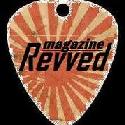
All posts from 2010 compiled into a monthly virtual magazine:
Music reviews: Ian Moore, Robert Plant, Alpha Rev, Godsmack, We Are the Fallen, Rolling Stones, Elton John/Leon Russell, Dwight Twilley, Sweet Psychosis and Plain white T's
Features: 311, Sammy Hagar, Kenny Wayne Shepherd, Metallica
Book Review: Full Metal Jackie

Various Rock Format Music Reviews - Godsmack, Alpha Rev, We Are The Fallen, Robert Plant, Ian Moore and the Lossy Coils

With much due respect and influence to Spinal Tap, here’s a list of some of the hottest new metal bands that might break through to the masses:

SCENE: Phoenix, Arizona, in the early ’90s. David (DLB) Bowers is honing his studio chops, recording local hip-hop acts and listening to rock, dreaming of the day he can mix everything he knows and loves together in a project that will reflect his passions. He meets a kindred spirit in fellow MC Doug (Rid) Moore, and the dynamic vocal duo eventually hooks up with fellow Phoenicians Sean Faulkner on bass, drummer Sean Gardner and guitarists Tracy (Tre) Thorstad and Cristin Davis to form Trik Turner. DLB was kind enough to sit down and speak with Album Network Rock Radio Director Michael D. Vogel (who is also a fan and outspoken supporter of Trik Turner) about his band’s history, their “keep it real” attitude, their self-titled debut and subsequent live experiences.

Webster’s defines a sound system as: sound (n), a particular auditory impression; the sensation perceived by the sense of hearing. And system (n), a regularly interacting or independent group of items forming a unified whole; a group of interacting bodies under the influence of a related force. Just like any great sound system, the eclectic Los Angeles-based rock band 311 is comprised of five perfectly matched–yet independently functioning–components, which when operating as a well-tuned unit creates an undeniable musical force.

Here’s an anecdote straight out of suburban youth culture (yes, it’s a true story–we have all lived this scenario in some way shape or form!). Jake–who at 13 years of age believes he resembles nobody, much less a pre-pubescent Eddie Vedder–is being shuttled by one of his parents to a Thursday afternoon guitar lesson. This week, he’s decided to take something of a break; he’ll grapple with no items from The Beatles songbook, nor will he try to master any of the requisite Jimi Hendrix solos. Instead, he plans to exchange the 15 hard-earned dollars crammed into the left pocket of his baggy black shorts for instructions on covering The Clash’s “Should I Stay Or Should I Go.” At the moment, though, he’s staring out the car window, listening to 311′s Soundsystem CD.

Fusing elements of dub, trip-hop, roots-reggae, hard-core punk with some vicious guitar rock, 311 create one of the most distinctive sounds in music today. It is this unique sound combined with insightful lyrics, and delivered in a highly potent musical cocktail, that has propelled 311 to rock SRO crowds as well as achieving multi-platinum status. From Hawaii to Hong Kong, Los Angeles straight home to Omaha, 311 have toured the globe, and along the way built a worldwide legion of followers through unparalleled high-energy performances and an uncompromising flow of consciousness.

Back almost eight years ago, inspired by some of the greatest groups of the early punk-rock movement, (i.e. Sex Pistols, The Clash, Ramones and the Buzzcocks), 311 formed in the heart of middle America–Omaha, Nebraska. Through three self-produced indie albums and an exhaustive touring schedule that has helped them cultivate one of the most intense (and biggest) “grassroots” fan bases around, the band has managed to maintain their straight-up, melodic hard-core style.
Flash to 1991. 311 trades in nearly two years of hard work and sweat to go with “the man.” Goin’ corporate, if you will. At the time, bandleader Nicholas Hexum says, “We’re going to do what we want to do, and we’re always going to be the people we’ve always been. So, in the long run, I don’t think it makes much difference either way.”

The scenario: a dark, crowded, hot and sweaty theater in Hollywood. The venue is stuffed to the gills; the audience is waiting for the first band to begin. A young lady standing next to me whispers in my ear, “I drove all the way from San Diego to see this show. I think Art Alexakis and Everclear are just awesome.” With a simple smile, I lean back and casually tell her that she’s in for quite a pleasant surprise. Complementing this bill is Toronto’s Our Lady Peace, out in support of their second album, Clumsy. As the quartet begins “Automatic Flowers,” the unassuming concertgoers start to move as one collective unit to the mesmerizing beat. Longhairs and buzz-cuts, leather jackets and suits all move to the sound of this one band. As the set ends, the young lady thanks me for the good advice, and asks that I refresh her memory as to the name of the band. I happily respond: Our Lady Peace!

Resilience and faith are two commodities that are essential in today’s fast-paced life. “The name Jars Of Clay” states Charlie Lowell, keyboard and vocalist for the band, “comes from scripture. ‘But we have this treasure in jars of clay to show that this all-surpassing power is from God and not from us’ (II Cor. 4:7). That one verse describes exactly the picture we are trying to communicate.” Once just a group of friends sharing a common faith and inspiration to make music, Jars Of Clay have begun a movement to bring religious music into the mainstream.






















 Welcome to Michael D. Vogel’s online portfolio. I am a Los Angeles-based music journalist/content creator, and self-professed music-fanatic/radio-aholic. With more than 20 years of experience in multiple facets of the music industry including; music programming/air talent for terrestrial and internet radio as well as record label artist promotion, I have a finger on the pulse of what's new and under the radar in the emerging music scene. Areas of specific expertise include, but not limited to: rock (heritage, mainstream, heavy metal/hard rock and alternative), pop and adult contemporary, as well as radio, pop culture, sports, exercise and politics. I am applying my passion for music as a freelance writer for the Examiner as National Music Examiner (Examiner.com) in addition to West Coast Editor for FreeGotham (FreeGotham.com). Find me at michael@vogelism.com.
Welcome to Michael D. Vogel’s online portfolio. I am a Los Angeles-based music journalist/content creator, and self-professed music-fanatic/radio-aholic. With more than 20 years of experience in multiple facets of the music industry including; music programming/air talent for terrestrial and internet radio as well as record label artist promotion, I have a finger on the pulse of what's new and under the radar in the emerging music scene. Areas of specific expertise include, but not limited to: rock (heritage, mainstream, heavy metal/hard rock and alternative), pop and adult contemporary, as well as radio, pop culture, sports, exercise and politics. I am applying my passion for music as a freelance writer for the Examiner as National Music Examiner (Examiner.com) in addition to West Coast Editor for FreeGotham (FreeGotham.com). Find me at michael@vogelism.com. 